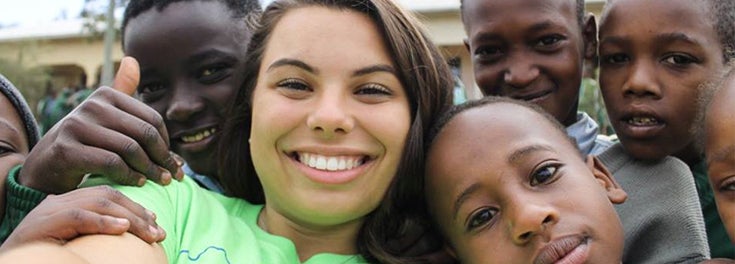
The power of bubbles in Tanzania cannot be underestimated. When URI students gave bottles of bubbles to the kids at the Maasai Joy Children’s Centre, they began dancing and giggling in the streets. The URI students, many traveling abroad for the first time, spent 10 days last summer teaching math, reading, writing, and physical education to these children, ages 3 to 12, in Tanzania’s Ekenywa Valley region.
“The trip changed my life,’’ says senior Charles Starkey. “It was a pretty powerful experience.’’
If the landscape alone didn’t inspire—mountains, fields of sunflowers, tall green grass—then the children did, with their spirit, kindness, and eagerness to learn.
Everyone wants to go to Europe. I want to see the kids again. I want to go back to Africa.
The URI students learned something, too: how to live happily with less. “In today’s world, we get caught up with things we think are important—money, a job, time,’’ says Ben Upham, a URI graduate on his third trip. “You see how little the children have and how much love and excitement they bring to life.’’
URI encourages its students to study, work and volunteer overseas, so why not Tanzania and the Maasai, an indigenous ethnic group of semi-nomadic herdsmen who live in huts and cook in holes dug in the ground. Kinesiology lecturer Karie Orendorff launched the program three years ago after falling in love with the country during a visit. Orendorff is also a world traveler who believes globetrotting opens hearts and mind—and “makes you a better person.’’
Besides teaching lessons, the URI students built a playground, complete with a merry-go-round, a slide and swings, and classrooms to replace what the children were using: chicken coops with cardboard walls. They also handed out supplies and athletic equipment—paper, markers, folders, backpacks, math cards, soccer balls and those bottles of bubbles, which are impossible to find there. Bubblefest 2015 was a hit.
After five days with the kids, Starkey and his classmates went on a safari in the Serengeti, where they saw giraffes, elephants, zebras, and cheetahs. A lion brushed up against Starkey’s tent one night. “I never felt like I was in danger,’’ he says. “It was an amazing experience.’’
They took selfies, with lions in the background. On the final night, they ate by candlelight outside their tents, comforted by a cool breeze. And they learned a few words in Swahili: jambo, (hello); asante, (thank you); and pole pole, (slowly slowly), which they say is the way people move in Tanzania.
Some students added another adventure to the trip by climbing Mt. Kilimanjaro, the highest peak in Africa. The trek to 19,341 feet took six grueling days. At times, senior Jessica Sexton didn’t think she’d make it. The altitude gave her an awful migraine, and the steep slope was terrifying. “But I made it,’’ she says. “Once I got to the top, I said, ‘Wow, I did this.’ Now I can accomplish anything.’’
Tanzania, the students say, will make them more compassionate physical education teachers. Starkey, for one, can’t wait to return. “Everyone wants to go to Europe,’’ he says. “I want to see the kids again. I want to go back to Africa.’’
